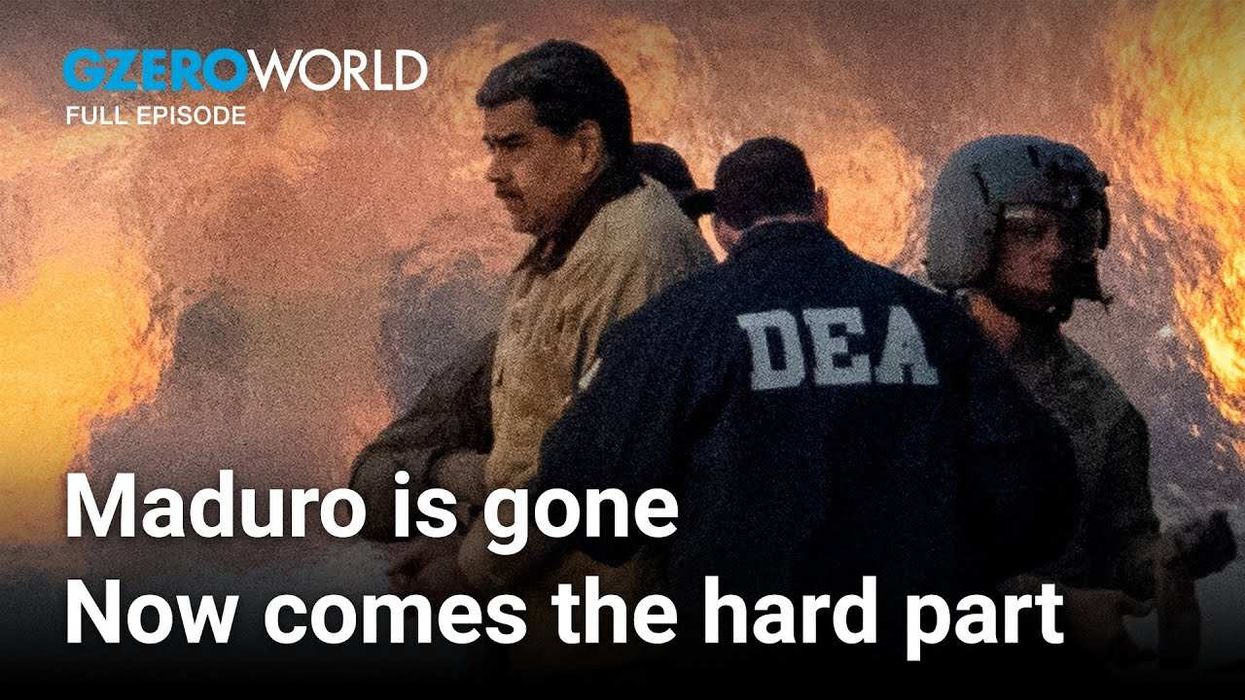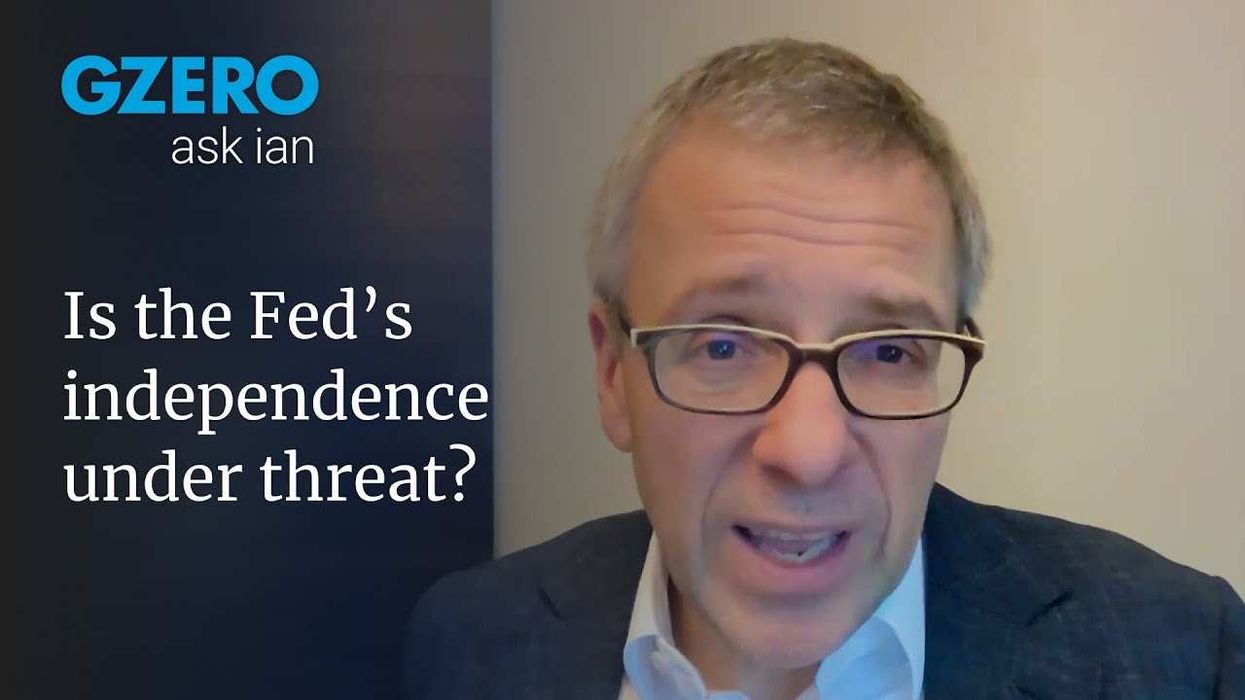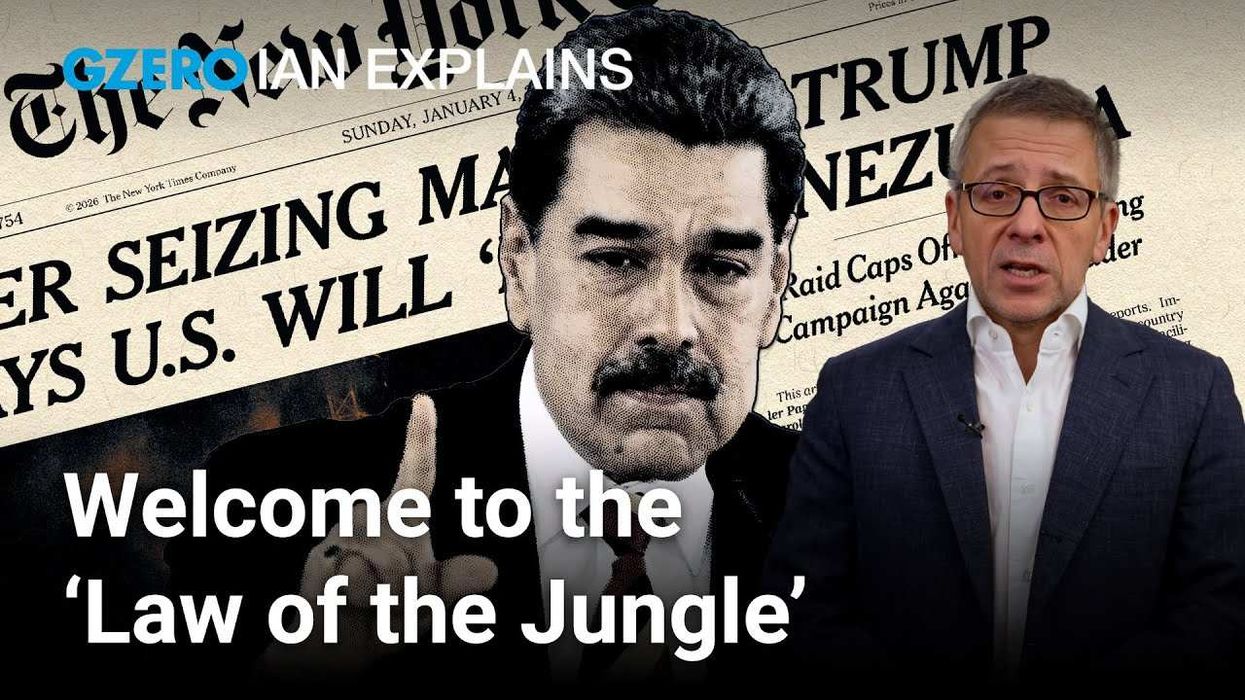VIDEOSGZERO World with Ian BremmerQuick TakePUPPET REGIMEIan ExplainsGZERO ReportsAsk IanGlobal Stage
Site Navigation
Search
Human content,
AI powered search.
Latest Stories
Sign up for GZERO Daily.
Get our latest updates and insights delivered to your inbox.
Top Risks of 2026
WATCH RECORDING
Ian Bremmer's Quick Take: Hi, everybody. And a happy end of summer back to school. Labor Day is coming up in a week and I am going to be back and at it in New York and around the world. But for now, a Quick Take and want to talk a little bit about the BRICS.
You saw the summit last week in South Africa, the headlines going into the summit, at least from the United States and its allies, was all about how Putin wasn't going to be allowed to attend. He had to attend virtually. One of the members of the BRICS, they can only send their foreign minister. Doesn't that show that, you know, the International Criminal Court means something, even though the Americans aren't actually a signatory to it? But that wasn't the real story.
The real story is that after a significant amount of Chinese diplomatic effort to expand the BRICS and make it more meaningful, which other members were skeptical about, there was significant success and an announcement that there will be six new members invited to join at the beginning of 2024. That's a very meaningful expansion. Egypt, Ethiopia, Argentina, UAE, Iran and Saudi Arabia. Presuming this all goes ahead, the BRICS will be the most important grouping of the so-called Global South. And I use that term advisedly because it's not quite clear that China is really a member of the Global South. It's much more important economically as a creditor of the Global South and increasingly wanting to have great influence over it, which a lot of members of the Global South want to resist. I'll get into that in a minute. But still, if you compare to what's been going on among the developing members of the G-20 to try to set a common agenda that more aligns with their interests as opposed to those of the United States and its allies in the G-7 who have become increasingly tight-knit post-Trump and post the Russian invasion of Ukraine.
I would say the BRICS are now supplanting that process as the most important piece of international architecture to watch, engage with, and to drive an agenda that matters to the countries of the Global South. And I think that the agenda-setting will be important on climate, it will be important on finance and the global economy. Maybe a bit on Russia, Ukraine, and also in efforts to resist weaponization of the US dollar. In other words, these are a whole bunch of countries that don't really like the fact that the Americans have leveraged a dominant position in the international financial system and as global reserve currency to have more influence over their own economic outcomes. I don't think this really means dollarization or the replacement with a BRICS currency any time soon. The role of the US dollar in global reserve currencies held by central banks around the world has been roughly the same for the last 20 years, and that, I suspect, will be true in another 10, another 15, 20 years as well. But nonetheless, in terms of a willingness of a whole bunch of countries to say we are not happy with the present global agenda as being set in their interests by the United States and allies, the BRICS will be an alternative, that is important, that will matter more economically over time and on some issues will be cohesive. So in that regard, I think it is important and I think we should spend more time following it and covering it.
As you know, we do other major sub-global confabs out there. A few points as rejoinders to that though, first of all, Argentina is not actually going to join. The present Argentine government very happy to. That is a leftist government that is much more aligned with China in particular. Their economy is falling apart. It is almost certain that after elections we will have a center-right or perhaps a far right libertarian government, either Bullrich or Milei in charge of Argentina. Both have said that they would not join the BRICS. So let's take Argentina out of the equation.
The countries that are left, it's interesting. It's all kind of one very broad region. We're talking about the Middle East and kind of northeast Africa. So again, UAE, Saudi Arabia and Iran, Egypt, and Ethiopia. Let's look at what that means. In the case of the Middle East, this is the region of the world that is becoming much less aligned with the United States, much more focused on the fact that they have to be self-sufficient, in part because the Americans aren't as interested, in part because the Americans are core competitors for energy, fossil fuel, energy development and export, then the Saudis, the Emiratis, and the Iranians.
So some of it is the US paying less attention, some of it is US driving a climate agenda to a greater degree than they were before. Some of it is the Americans are not a part of OPEC and competing with OPEC. And so for all of these reasons, what you see is the countries from the Middle East wanting to go more their own way, wanting to balance and hedge and be a part of everything. So keep their security relations with the US if they're Saudi Arabia and the UAE, but also work more closely with the Chinese and with everyone else that has significant demand for that energy. Hence the Saudis and the Iranians having a diplomatic engagement that the Chinese, that breakthrough sponsored by China, hence the Saudis inviting everyone, the Americans and the Chinese and the Ukrainians, everyone but Russia to be a part of what has been so far the most significant diplomatic effort around the Russian-Ukraine war and the fact that the Saudis, the Emirates and the Iranians are all now joining the BRICS is a significant additional movement. I would argue the Middle East is becoming more geopolitically stable, but also less aligned with the United States, more playing a balancing role with everyone. In the case of Ethiopia, that is a very significant, very populous country in Africa that is overwhelmingly aligned economically with China. That's where the money is. The United States doesn't play much of a role.
I think the next round of BRICS expansion looking forward is probably more likely to have the most interest from other sub-Saharan African countries. How many actually join is an open question, but that's certainly the easiest grouping that you can see wanting to be a part of the BRICS for all the reasons we just talked about. And then finally, I would say, let's also recognize what the BRICS is not. The BRICS is not a China-led competitor to the G-7, and that is because most of the countries that are in the BRICS, not all, but most do not want it to be. They don't want it to be led by China. Think about India in that regard in particular. And they don't want it to be a competitor to the G-7 where they have to join one and not the other. They want to have good economic relations with both. The economic order is a multipolar order. It is not a Cold War environment, and the security order is driven primarily by the United States. And you have to put BRICS expansion into that broader global framework. So the BRICS will matter more economically. They will facilitate far more Middle Eastern hedging. They will also facilitate greater agenda-setting in the global economy, broadly defined by the Global South. But that is not suddenly a decoupling of the world into G-7 versus BRICS. That's certainly not what we're going to see. So very important, a meaningful diplomatic win for the Chinese, not aligned with what the United States is trying to accomplish with the G-7 and with NATO broadly speaking, but not directly confrontational either. It's messy, it's nuanced. It doesn't easily lend itself to a five-second headline, but a ten-minute Quick Take. What the hell?
So anyway, that's it for me. Hope everyone's doing well. Enjoy this last days of summer and I'll talk to you all real soon.
Keep reading...Show less
More from Quick Take
Europe takes control of Ukraine’s future
December 15, 2025
Trump’s new national security strategy targets Europe
December 08, 2025
Trump, Russia, and a deal Ukraine can’t accept
December 02, 2025
Europe divided as US pushes Ukraine-Russia peace deal
November 24, 2025
Trump escalates sanctions against Russia
November 10, 2025
Is Abu Dhabi becoming the global capital of AI development?
November 02, 2025
What the Trump-Xi meeting means for US-China relations
October 30, 2025
Trump’s East Wing demolition, Binance pardon, and tariffs on Canada
October 27, 2025
Trump brokers peace: Hostages freed and guns fall silent in Gaza
October 13, 2025
Trump's role in brokering Israel-Hamas deal
October 09, 2025
America’s short-term wins vs. long-term risks
October 06, 2025
Israel is facing real consequences over Gaza annexation plans
September 29, 2025
Is Israel risking global isolation over Gaza?
September 22, 2025
Charlie Kirk's assassination will make things worse in the US
September 15, 2025
Russia-Ukraine war escalation
September 08, 2025
China’s push for a new world order
September 02, 2025
Is the US preparing to strike Venezuela?
August 27, 2025
Is American capitalism still capitalism?
August 25, 2025
Zelensky, Trump, and NATO: A united front on Ukraine?
August 18, 2025
Trump and Putin to meet in Alaska to discuss Ukraine
August 11, 2025
US government rescinds West Point role for former cyber director
August 04, 2025
US-EU trade deal marks a win for Trump
July 28, 2025
The US, China, and the critical minerals question
July 21, 2025
Epstein conspiracies divide Trump's MAGA base
July 14, 2025
US-Brazil relations in crisis
July 10, 2025
Elon Musk vows to start a new political party
July 07, 2025
What Zohran Mamdani’s win really signals for US politics
June 30, 2025
Iran's retaliation shows strategic weakness
June 23, 2025
US enters war with Iran: What comes next?
June 22, 2025
Iran looks to negotiate ceasefire
June 16, 2025
Elon vs. Trump: Billionaire fallout goes public
June 06, 2025
Elon Musk steps down from Trump administration
May 29, 2025
Trump's weekend of geopolitical success
May 12, 2025
Can Trump and Carney reset US-Canada relations?
May 07, 2025
Trump’s ‘less is more’ message is un-American
May 05, 2025
Ian Bremmer on Trump's first 100 days
April 28, 2025
Trump’s America: A kleptocracy but not a police state
April 23, 2025
Inside the Harvard-Trump showdown
April 21, 2025
Can the US win by undoing globalization?
April 14, 2025
Who benefits from Trump's tariff wall?
April 07, 2025
Trump's tariffs & the end of globalization
April 03, 2025
Leaked Signal chat shows Trump team's mindset
March 26, 2025
What Trump team's war plans leak revealed
March 25, 2025
Is Europe in trouble as the US pulls away?
March 24, 2025
Putin-Trump Ukraine call is a small win for both sides
March 18, 2025
What will Trump offer Putin in Ukraine ceasefire talks?
March 17, 2025
Ukraine ceasefire deal now awaits Putin's response
March 11, 2025
Can Europe broker a Ukraine ceasefire?
March 03, 2025
What Trump-Zelensky fallout means for Ukraine war
March 01, 2025
Why the US-Ukraine minerals deal changed
February 26, 2025
Germany's close election limits its ability to lead Europe
February 24, 2025
Ukraine hopes for Europe's help as US negotiates with Russia
February 18, 2025
JD Vance stuns Munich conference with critique on European democracy
February 14, 2025
Trump-Putin chat over Ukraine "deeply" worries Europe
February 13, 2025
What is Trump's Gaza playbook?
February 10, 2025
Why cutting USAID will hurt American foreign policy
February 05, 2025
Why is Trump starting a trade war with Canada?
February 02, 2025
How Trump's assertive foreign policy impacts international relations
January 27, 2025
Trump's Davos address sets up big shifts in US strategy
January 24, 2025
From Davos: How global leaders are grappling with Trump’s return
January 20, 2025
Ian Bremmer on the forces behind the geopolitical recession
January 17, 2025
What Greenlanders might want from a deal with Trump
January 13, 2025
New Year's Day terror attacks highlight America's divisions
January 03, 2025
GZERO Series
GZERO Daily: our free newsletter about global politics
Keep up with what’s going on around the world - and why it matters.















































































